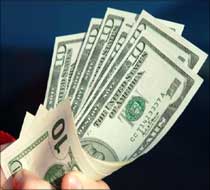 India on Thursday pitched for higher ratings from global agency Fitch citing good inflow of foreign funds, high returns from the market and steps being taken by the government for fiscal consolidation.
India on Thursday pitched for higher ratings from global agency Fitch citing good inflow of foreign funds, high returns from the market and steps being taken by the government for fiscal consolidation.
"We pitched for a rating upgrade. We told them look at the FDI inflows, look at the returns in the market. We said we are committed to capping subsidy at 2 per cent," said a Finance Ministry official after a meeting with the representatives of Fitch in New Delhi.
Fitch had last rated India in 2010, giving India's foreign and local currency rating at 'BBB-/stable'.
Last year, the agency had affirmed the 'BBB-' rating for India indicating moderate degree of safety regarding timely servicing of financial obligations.
The representatives of the US-based credit rating agency would meet the officials of the Finance Ministry again on Friday and Fitch is likely to come out with its assessment within a month.
The official said that with FDI inflow at its highest and FIIs pumping money into Indian markets, the country is an able candidate for a ratings upgrade. Since 2011, Fitch has downgraded all major economies in the world.
Asked if Fitch raised concerns over the burgeoning current account deficit, which arises when import of goods and services exceeds a country's exports, the official said that with high inflow of foreign funds CAD is expected to be high.
"When you have this kind of inflow, a high CAD is normal," he said. CAD had touched 4 per cent of GDP at the end of December 2011.
The foreign direct investment into India in the last fiscal was around $36.50 billion (around Rs 1.82 lakh crore).
Besides, foreign institutional investors have put in around $12 billion into the Indian markets in the last two months.
High CAD is also putting pressure on the rupee, which has slumped 22
It plunged against the dollar to a historic low of 54.56 before closing yesterday at 54.50, the lowest closing ever.
Finance Ministry officials had earlier held similar meetings with representatives of other credit rating agencies -- Moody's and Standard and Poor's.
Much to the discomfort of the government, S&P last month lowered India's rating outlook to negative from stable, while retaining the rating at BBB.
It had cited poor fiscal conditions and economic fundamentals for revision in outlook.
India's high fiscal deficit is also putting pressure on its finances and the government is targeting to bring down the subsidy bill to below 2 per cent of GDP this fiscal and 1.75 per cent in the subsequent years.
Last fiscal, it had provided Rs 65,000 crore (Rs 650 billion) in fuel subsidy, which it hopes to trim to Rs 40,000 crore (Rs 400 billion) in 2012-13.
High subsidies are putting pressure on the fiscal deficit, which touched 5.9 per cent of the GDP in 2011-12 and is budgeted at 5.1 per cent in 2012-13.
While petrol prices were freed from government control in 2010, the government has to subsidise the oil marketing companies for selling diesel at prices lower than market determined rates.
Currently, government provides a subsidy of Rs 14.50 per litre on diesel, Rs 31.88 per litre in the case of kerosene, and in the case of LPG it is Rs 412 per cylinder of 14 kg.
India imports about 80 per cent of its crude oil needs.
Finance Minister Pranab Mukherjee said in the Rajya Sabha on Wednesday that the government would launch austerity measures to deal with the tight fiscal situation and would try to keep subsidies on oil, fertiliser and food within 2 per cent of the gross domestic product.









